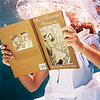Take a photo of a barcode or cover
adventurous
mysterious
medium-paced
Plot or Character Driven:
Plot
Strong character development:
Yes
Loveable characters:
Complicated
Diverse cast of characters:
Complicated
Flaws of characters a main focus:
Complicated
adventurous
He had no conscious memory of what he had seen; but that night, as he sat brooding at the entrance of his lair, his ears attuned to the noises of the world around him, Moon-Watcher felt the first faint twinges of a new and potent emotion. It was a vague and diffuse sense of envy--of dissatisfaction with his life. He had no idea of its cause, still less of its cure; but discontent had come into his soul, and he had taken one small step toward humanity.
This book is really hard to review -- not because of its content, but because of the long shadow it casts. Disclaimer: I still haven't seen 2001 the film (I went about this all backwards), but it had seeped its way into pop culture to the extent that I thought I knew the story. Culture-text! Everything is culture-text, y'all. It happens in little ways, too: the super-computer at our workplace is nicknamed HAL, and has a quote from the film taped to its monitor.
Appropriately enough, I can see 2001's bones and DNA in so much science fiction that came later (primarily Moon, Interstellar, and Mass Effect). This quote from Clarke's working diary especially made me think of ME: "May 28, 1964. Suggested to Stanley that "they" might be machines who regard organic life as a hideous disease. Stanley thinks this is cute..."
And then you also have the Star-Child at the end of the game and Buzz Aldrin as the Storyteller... It's funny picking up these breadcrumbs long after the fact, in the reverse order I was meant to.
More quotes from his foreword to the millennial edition:
Though NASA was spending the entire budget of our movie (over $10,000,000) every day, space exploration seemed to be marking time. But the portents were clear; I often remarked to Stanley that the film would be still on its first run when men were actually walking on the Moon.
So in writing our story line, at the early dawn of the space age, Stanley and I had a credibility problem; we wanted to create something realistic and plausible, that would not be made obsolete by the events of the next few years. And although our original working title was How the Solar System Was Won, Stanley was aiming at something more than a straightforward tale of exploration. As he was fond of telling me, "What I want is a theme of mythic grandeur."
Well, as the real year 2001 approaches, the movie has become part of popular culture: I doubt if even in his wildest dreams Stanley imagined that one day a hundred million Americans would know exactly who (what?) was speaking when a Super Bowl commercial announced in a silken yet sinister voice "It was a bug, Dave."
'Mythic grandeur' most definitely fits the book, and all the things from the ending that I don't know how to describe. Most of all, I feel a strange wistful romanticisation for the space race: this era which churned out such classics of science fiction, and when mankind had their sights firmly fixed on the stars, when space totally and wholly captivated people's imaginations. It bums me out knowing the declining state of NASA today, which was also nicely kinda touched upon in Interstellar (although perhaps things like the Curiosity rover can turn things around; that landing and people's attention to it got me all verklempt).
I was especially interested in the bits from ACC's foreword about how science fiction became science fact: "The crew of Apollo 8, who at Christmas, 1968, became the first men ever to set eyes upon the lunar far side, told me that they had been tempted to radio back the discovery of a large black monolith. Alas, discretion prevailed."
Seriously, I can't stop talking about how great this foreword was (I read it after finishing the book). It's warm and witty and gives some interesting contextualisation of 2001, which also makes me want to read the full making-of -- ACC's voice here is also more readable than the drier tone of the book itself. During scenes of long descriptions of spectacular space vistas, it just occurred to me that this was when I probably should've been watching it on a movie screen instead. And the 'evolution' part of the book really dragged, though it was interesting in its own way.
HAL had a much smaller role than I expected, but admittedly, it isn't a very long book. I had no idea what to expect from the later portions of the book, though again, I can see its influence in Interstellar: its wormhole and slingshot and what they find at the end of the universe, its too-human AIs that actually are completely benevolent and helpful. Ditto with what happens in Moon: Gurdy's presentation obviously riffs on 2001/HAL and our pop cultural expectations of the sinister AI, so that it's a surprise when they turn out to be kind. I'm certain there are other 2001 homages that I've seen but forgotten.
I haven't even spoken much about the book, its plot, and how it's written. Again: this book is really hard for me to discuss by itself, because I almost can't just see it by itself. I find my thoughts gravitating towards its palpable influence in the genre instead. It drags at times, and sometimes you can really tell it was written for film, but it's enjoyable and terrifying and curious by turns. The slow ominous hints and foreshadowing of HAL's mutiny are especially great, and HAL's voice is so well-written: sinisterly chipper and passive-aggressive and sulky by turns, and his unplugging was horrific. Amazing. So I'm excited to watch 2001 now, with the extra knowledge the book has given me.
Another quote from the foreword:
The novel you are about to read has sometimes been criticized for explaining too much, and thus destroying some of the movie's mystery. (Rock Hudson stormed out of the premiere complaining "Can someone tell me what the hell this is all about?")
I don't even know what to make of the ending. It's mystifying and leaves far more questions than it answers, so I wonder what the sequels might give me.
Randomly: The Wikipedia article for 2001 is classified under List of stories set in a future now past, which is one of my favourite things. Retro-future! I love it.
(Sidebar: Caitlin, we were both right -- the book was published a few months after the film, but ACC started writing it as a novel before the screenplay, but then ended up working on both concurrently.)
Also, seriously, the writing of this movie/screenplay seems like it was such a fascinating experience. More excerpts from his working diary:
Sept. 28. Dreamed I was a robot being rebuilt. Took two chapters to Stanley, who cooked me a fine steak, remarking, "Joe Levine doesn't do this for his writers."
[...]
November 28. Phoned Isaac Asimov to discuss the biochemistry of turning vegetarians into carnivores.
What was Arthur C. Clarke's life, I swear.
adventurous
mysterious
reflective
tense
Strong character development:
Yes
Loveable characters:
No
Diverse cast of characters:
No
Flaws of characters a main focus:
No
I saw the movie in college, I think, and I mostly remember that I didn't like it. I thought it was boring and that there was mostly silence, and a pen floating and a weird baby. After reading this book, I think it likely doesn't translate well to the screen unless you have read the book. The book is set in 3 primary stages and a lot of the action takes place without dialogue. The premise of alien interference sparking human evolution is interesting and drawn out to some reasonable conclusions. The most famous bit, about HAL going murderous, isn't even directly related to the main story and the aliens.
This is a slow-moving tale, with big events happening at a geological time scale. It is reflective, pensive, with plenty of time to get lost in your thoughts as you ponder humanity's past, present, future, and the afterlife. The overarching theory was interesting enough but we don't find out much about the aliens or what Dave has gotten himself into. I guess there is more in the sequels. This is a worthwhile read and I think I'll watch the movie again, see if it is less boring now that I know what is happening.
This is a slow-moving tale, with big events happening at a geological time scale. It is reflective, pensive, with plenty of time to get lost in your thoughts as you ponder humanity's past, present, future, and the afterlife. The overarching theory was interesting enough but we don't find out much about the aliens or what Dave has gotten himself into. I guess there is more in the sequels. This is a worthwhile read and I think I'll watch the movie again, see if it is less boring now that I know what is happening.
adventurous
mysterious
medium-paced
challenging
informative
mysterious
reflective
tense
medium-paced
Plot or Character Driven:
Plot
Strong character development:
No
Loveable characters:
Yes
Diverse cast of characters:
No
Flaws of characters a main focus:
No
dark
reflective
medium-paced
adventurous
mysterious
tense
fast-paced
Plot or Character Driven:
Plot
Strong character development:
Complicated
Loveable characters:
No
Diverse cast of characters:
No
Flaws of characters a main focus:
Complicated
adventurous
mysterious
reflective
fast-paced
Plot or Character Driven:
Plot
Strong character development:
Complicated
Loveable characters:
No
Diverse cast of characters:
No
Flaws of characters a main focus:
No
Mind boggling and terrifying. This is a great book for someone who has not read much science fiction but is interested in dipping their feet. My copy had pictures from the movie, which was visually stunning. The descriptions in the book were not as captivating as in the movie, but both leave a lingering, curious feeling of a very common question humans ask themselves: are we alone in this universe?




